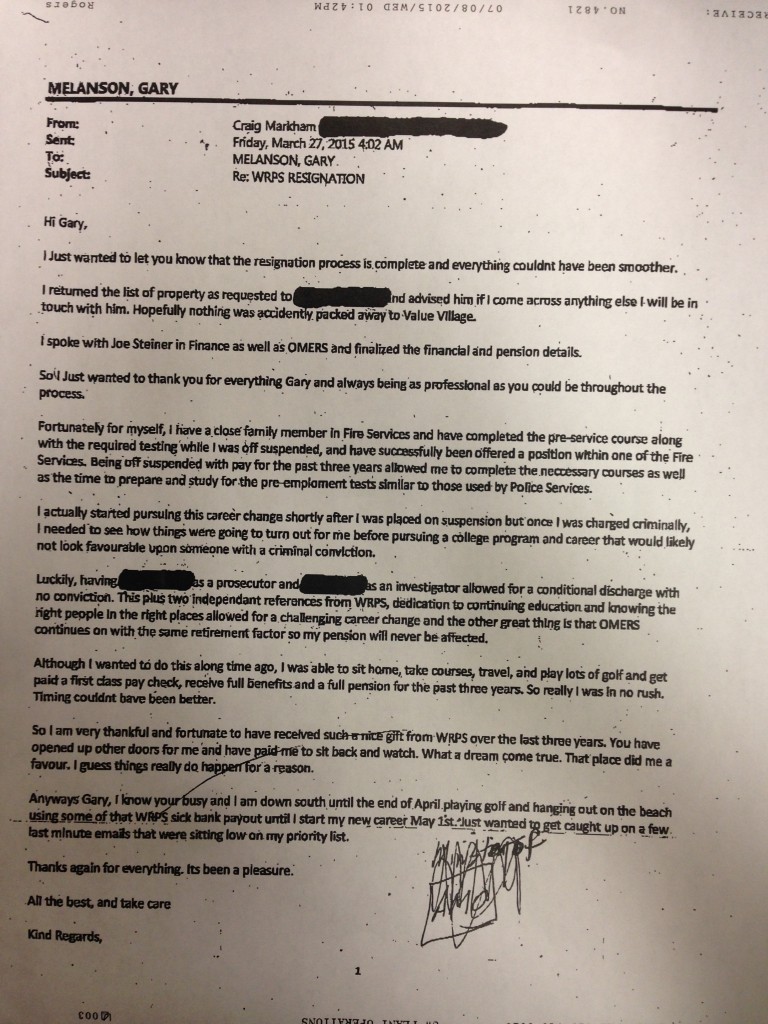To Serve and Protect
"I was able to sit home, take courses, travel, and play lots of golf and get paid a first class [paycheque] receive full benefits, and a full pension for the last three years."
"I'm not the taxpayer bandit. It's not like I came in during the middle of the night with a mask on and robbed the taxpayer. It just sounds like I laid on the beach and drank pina coladas for three years."
"I fell on my sword: took responsibility since Day 1. [The confidential information] was given to an acquaintance so he could make better choices on who he was associating with."
Craig Markham, former Waterloo Regional Police constable

Ontario is the sole province in Canada where police officers receive their paycheques even while they are facing criminal charges. Mostly, under these circumstances officers are given administrative duties. They stand back from their usual agency in the pursuit of actively serving and protecting the public. Instead they are sidelined, to sit at the station front desk, to file, to take telephone calls. Waterloo Regional Police decided not to offer any of those options to this particular officer.
"Why can't I come in? I could've swept the parking lot. I could've made lunches. I could've cleaned toilets. It would have made me feel like I was earning money", Craig Markham complained, clearly unhappy with the way his case was treated. He offered to perform custodial work, cleaning toilets, showers and sinks. He was unable to look for another full-time job since the Police Services Act prohibits officers from seeking employment elsewhere while they are still formally employed.
He was required to sign in at a police station every day while hearings of the Police Services Act into his actions commenced, followed by an appeal process which he finally aborted by resigning in February of 2015. During the hearings he had confessed that an acquaintance called him in 2011 relating to her partner. Then-constable Markham was stationed at the front desk of the Kitchener police station the following day and used the police system to find that the man was in police custody.
He then accessed the holding cells to speak with the man, someone with ties to the Hells Angels. He took the initiative to send confidential police information about this man to another acquaintance who considered the imprisoned man a friend. This was, Mr. Markham explained, an effort on his part to alert his acquaintance that it would be to his advantage to be more discriminating about whom he chose to befriend.
As a result of having breached Police Act conditions in this manner, he was disciplined by being taken off the job to sit at home awaiting the conclusion of the investigation and the hearings. During that three-year period, the 37-year-old received his regular salary which amounted to $350,000 reflecting that time frame. Until and unless he was formally found guilty of having committed a breach of trust with which he was charged, he remained on the payroll.
He was frustrated and irritated by the situation, feeling himself hamstrung, unable to launch out on any other initiative, having little option but to wait out the period until a final decision was reached by the police services board. He decided to send a sarcastic email outlining what he saw as the absurdity of his situation to the police chief of the Waterloo Regional Police. In which he wrote of himself as being "down south until the end of April playing golf and hanging out on the beach using some of that WRPS sick bank payout."
The Waterloo Regional Police Chief Bryan Larkin released the contents of the email at a police services board meeting, accusing the former constable of guilt in abuse of the system. The officer with eleven years in the force, in turn accused the police chief of using him as a scapegoat in his own political agenda.
"You're innocent until proven guilty and based on a number of allegations laid against police because of our profession, they should be afforded the opportunity to be paid while they're suspended", explained Bruce Chapman, president of the Police Association of Ontario representing the province's officers. Withholding pay from a suspended officer is analogous to the assumption of guilt, he pointed out and since most complaints against officer don't lead to charges. suspension with pay protects them from charges without substance.
During the time that Mr. Markham was suspended he took a firefighting course. He now has another full-time job, and it is assumed that he was hired locally as a firefighter. Under prevailing rules a chief of police handpicks a hearing officer and a prosecutor for hearings. According to Mr. Markham it is a biased process with the chief informing the hearing officer of the action he wishes to be taken and an employee would hardly disregard the wishes of their employer.
He does admit that he would have preferred to have been able to retain his job. He misses the badge and uniform. "I do miss being a police officer. What I don’t miss is working for that organization. My days of taking orders from the chief of police in Waterloo are done."

Labels: Ontario, Political Realities, Security

0 Comments:
Post a Comment
<< Home